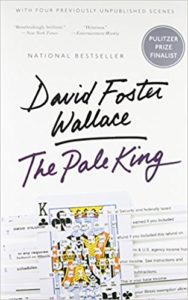 I bought this book a few years ago but delayed reading it until this Spring. Maybe I was afraid of thinking about the trauma of his suicide while reading it. I shouldn’t have worried. There are autobiographical elements in here I assume…He has a semi-absurd character with a dramatic sweating disorder, which I’m guessing from the opening line of his Kenyon graduation speech he sometimes also suffered from. But he’s not dwelling in an obvious way on suicidal ideation. On the contrary he seems to be mulling cures for depression, through a kind of learned meditative technique for life.
I bought this book a few years ago but delayed reading it until this Spring. Maybe I was afraid of thinking about the trauma of his suicide while reading it. I shouldn’t have worried. There are autobiographical elements in here I assume…He has a semi-absurd character with a dramatic sweating disorder, which I’m guessing from the opening line of his Kenyon graduation speech he sometimes also suffered from. But he’s not dwelling in an obvious way on suicidal ideation. On the contrary he seems to be mulling cures for depression, through a kind of learned meditative technique for life.
The recurring theme of The Pale King is boredom, and maintaining a kind of alert concentration throughout that boredom.
My guess is he picked the location of an IRS examination office in flat, empty, off-the-highway Peoria, Illinois as an extreme setting for testing his ideas, but also for testing himself. Is he a good enough writer to make even that topic (boredom) and that setting (an IRS examiner’s office) still scintillating writing? Of course he can. He’s freaking David Foster Wallace. During the week of filing another year’s worth of taxes, I recommend reading a great novel about IRS examiners.
David Foster Wallace is among my top three all time favorite authors,1 so I’m not surprised I enjoyed The Pale King so much.
On one page Wallace plays the straight man, describing incredibly detailed inner thoughts of a character, or the minutiae of a scene in hyper-realism. And in the next page he switches it up by introducing an absurdity, like a tax reviewer who levitates right out of his chair when concentrating hard enough, or an IRS building with an entire front-entrance facade designed to look like a 1040 tax form.
 Just like with Infinite Jest, he fractures the narrative – jumping time, location, perspective, and characters without warning. If you link Wallace’s fractal together to figure out who all the narrators and character are, that’s fine, but not necessary to enjoy this on your first read-through. A few essays ran earlier in the New Yorker and stand alone as individual chapters.
Just like with Infinite Jest, he fractures the narrative – jumping time, location, perspective, and characters without warning. If you link Wallace’s fractal together to figure out who all the narrators and character are, that’s fine, but not necessary to enjoy this on your first read-through. A few essays ran earlier in the New Yorker and stand alone as individual chapters.
Some of his chapters are unforgettable. The nerd examiner and the unbearably pretty girl at the post-work bar, she with the tragic love story and he with the levitating powers of concentration. The absurd goody two-shoes who as a child drove everyone completely bonkers. The centerfold chapter with the never-ending “how I became an IRS examiner” childhood story of trauma and slackerism, nearly a complete novel in itself full of family psychological drama and insights. The sweating man trying to avoid triggering his sweat response. The infinite-mirror-meta-story of an IRS trainee named “David Foster Wallace” who arrives at the Peoria office, only to suffer a mixed up-identity with another more senior IRS examiner David Wallace, blended with an “author’s forward” by “David Foster Wallace” to claim all of the story is “true.” Typical post-post-post-modern DFW bullshit but totally enjoyable from my perspective, complete with diversionary and diverting footnotes as rabbit-holes.
That famous graduation speech in fact from 2005 captures some of what I think he’s trying to do in The Pale King. How do we maintain a meditative (Buddhist?) attentiveness, even while surrounded by deadening bureaucracy or deadening inputs from normal adult life?
Clearly he didn’t have answers in his own life. But he suggested a sort of path for us to try to follow. He couldn’t do it. But we can keep trying.
Please see related posts:
All Bankers Anonymous Book Review In One Place
Post read (206) times.
- Peter Matthiessen and Nabokov thanks for asking ↩



